Are Statues, Codes, Rules, Regulations Laws?
In an effort to preserve the wisdom, information and voices of those wise people who have studied and shared the foundational knowledge and vision of how America is supposed to live (under Godʻs law) we bring you the Founding Files. The written content is used with explicit permission and in itʻs original form while video content and conversation follows closely, with room for human expression and the auditory method of communication.
As an American the most powerful right we have is the power to make our government answer to us. Instead, we are taught that we must answer to government and the only way we can affect change is by voting every 4 years. Start learning the truth. Learn the basics of law and bring your life to the private domain where government can no longer govern your lives. Put yourself in a position to stand on law, and your rights, instead of accepting the rule of statutes and codes. Statutes and codes that long settled case law says doesn't even apply to you.
Many do not know that statues are not law and who those statutes actually apply to or how the government is able to hold people accountable to statutes.
Do you know why your lives and your business are regulated by government and statutes? Do you know why your are forced to get licenses for everything you do with your life and your business? Law says government cannot regulate you as long as you are not causing harm to others.
ARE STATUTES, CODES, RULES & REGULATIONS LAWS? October 9, 2018
Lets look at some case law:
With such overwhelming case law there is no question about the fact of the claim made here statutes are not law.
Article 1 section 8 clause 14 of the Constitution says clearly the government makes the rules for the government not the people. Cruden v. Neale, 2 N.C. 338 (1796) 2 S.E.].
https://www.ecclesia.org/forum/topic.asp?TOPIC_ID=390
Constitutionally, "a statutory presumption cannot be sustained if there be no rational connection between the fact proved and the ultimate fact presumed." Tot v United States, 319 US 463, 467; 63 S.Ct. 1241, 1245, 87 L.Ed.2d 1519 (1943).
"Statutes apply only to state created creatures known as corporations no matter whether [creatures of statute and offices of] state, local, or federal [government]." (Colonial Pipeline Co. v. Traigle, 421 US 100. (1975) ).
“A statute will not be presumed to have extra territorial effect... outside the [territorial] jurisdiction of the legislature.. over persons residing outside the (territorial) jurisdiction of the legislature." (Bond v Jay, 7 Cranch 350, 3 L Ed 367). “
A “Statute’ is not a Law,” (Flournoy v. First Nat. Bank of Shreveport, 197 La. 1067, 3 So.2d 244, 248),
“A “Code’ or Statute’ is not a Law,” (Flournoy v. First Nat. Bank of Shreveport, 197 La. 1067, 3 So.2d 244, 248),
A “Code’ is not a Law,” (In Re Self v Rhay Wn 2d 261), in point of fact in Law,)
A concurrent or ‘joint resolution’of legislature is not “Law,” (Koenig v. Flynn, 258 N.Y. 292, 179 N. E. 705, 707; Ward v State, 176 Okl. 368, 56 P.2d 136, 137; State ex rel. Todd v. Yelle, 7 Wash.2d 443, 110 P.2d 162, 165).
…lacking due process[of law], in that they are ‘void for ambiguity’ in their failure to specify the statutes’ applicability to ‘natural persons,’ otherwise depriving the same of fair notice, as their construction by definition of terms aptly identifies the applicability of such statutes to “artificial or fictional corporate entities or ‘persons’, creatures of statute, or those by contract employed as agents or representatives, departmental subdivisions, offices, officers, and property of the government, but not the ‘Natural Person’ or American citizen Immune from such jurisdiction of legalism. (Rodriques v. Ray Donavan, U.S. Department of Labor, 769 F.2d 1344, 1348 (1985));
All codes, rules, and regulations are for government authorities only, not human/Creators in accord with God’s Laws. “All codes, rules, and regulations are unconstitutional and lacking due process of Law..”(Rodriques v. Ray Donavan, U.S. Department of Labor, 769 F.2d 1344, 1348 (1985)); …lacking due process of law, in that they are ‘void for ambiguity’ in their failure to specify the statutes’ applicability to ‘natural persons,’ otherwise depriving the same of fair notice, as their construction by definition of terms aptly identifies the applicability of such statutes to “artificial or fictional corporate entities or ‘persons’, creatures of statute, or those by contract employed as agents or representatives, departmental subdivisions, offices, officers, and property of the government, but not the ‘Natural Person’ or American citizen Immune from such jurisdiction of legalism.
-
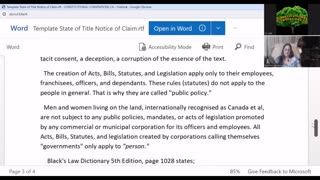 14:31
14:31
We The People - Constitutional Conventions
2 months agoNotice of Demand and Trespass Proof of Jurisdiction and Contract
9202 -
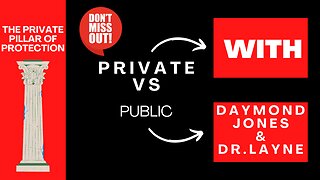 34:23
34:23
Health Freedom with Dr. Layne
1 year agoPrivate vs. Public Domain. The Private Pillar of Protection with Daymond Jones.
4002 -
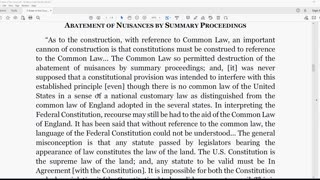 17:01
17:01
Only the People can Save our Republic
11 months agoRules of the Court
5621 -
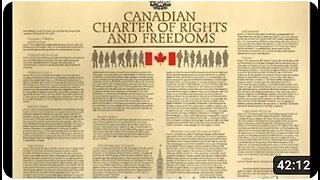 42:11
42:11
We The People - Constitutional Conventions
1 year agoCharter of Rights and Freedoms, exposing the fraud and deception through Acts and Statutes.
5619 -
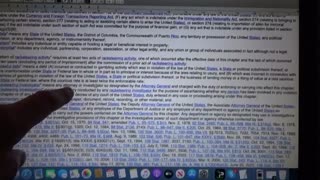 1:04:39
1:04:39
avoiceofreason
1 year agoColor of Law ~ Statutes~ Code~ explained
3587 -
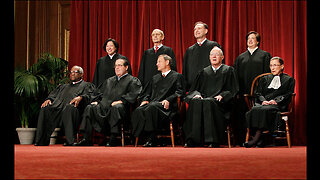 6:51
6:51
What If Everything You Were Taught Was A Lie?
1 year agoStatutes and Codes Are Not Law Corporate Policy Right to Travel and Privileges !
8062 -
 7:13
7:13
Barry Zalma, Inc. on Insurance Law
11 months agoPolicy Enforced as Written
68 -
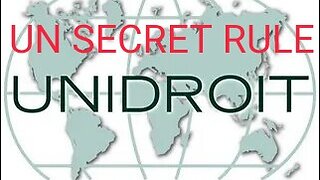 28:28
28:28
TheWarAgainstYou
5 months agoU.S. Courts Are U.N. Courts Under UNIDROIT Treaty. Uniform Commercial Code Secret World Control
5.35K6 -
 7:40
7:40
Explosivo55
5 months ago10.4.14 Magistrates, Legislative laws unlawful
43 -
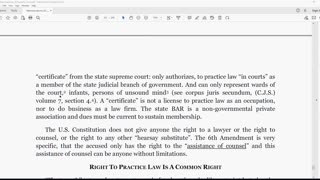 10:27
10:27
Only the People can Save our Republic
11 months agoMemorandum Right to Practice Law 18 of 19
1.96K1